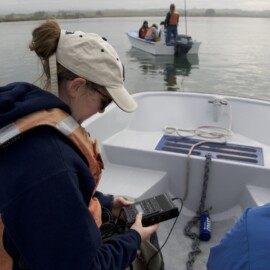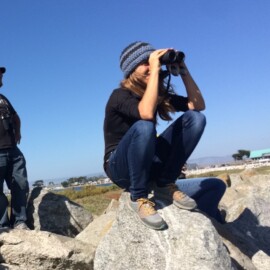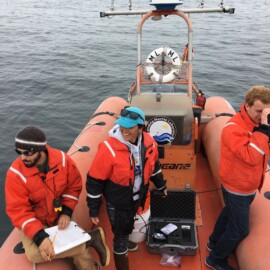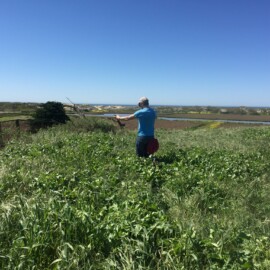Opportunities
Prospective graduate students:
Dr. McDonald typically accepts two new students each year. If you are interested in applying to the graduate program through the Vertebrate Ecology Lab, please check out the MLML graduate program website and read about the research conducted in the Vertebrate Ecology Lab (Research page and current and former students). If you are still interested, please send Dr. McDonald the following:
- a letter describing your research interests and why you are interested in the Vertebrate Ecology Lab
- a curriculum vitae or résumé
- copies of your college transcripts
It is recommended that prospective students schedule a trip to Moss Landing to view the facilities and to meet Dr. McDonald and some of the students.
Program overview:
Graduate students in the MLML Vertebrate Ecology Lab study marine and estuarine birds, marine mammals, and sea turtles. Under the guidance of advisor Dr. Birgitte (Gitte) I. McDonald, students pursue a program tailored to prepare them for careers in research, teaching, or environmental studies, or for entrance into advanced graduate programs. The program combines classwork and field studies to provide students with experience in all aspects of field research, including designing field studies, writing grant proposals, conducting research, analyzing data, and writing papers regarding research findings. For more information about the graduate program, admission requirements, and curriculum please visit the graduate program website.
A review of the thesis projects of current Vertebrate Ecology Lab students, the thesis titles of previous graduates of the Vertebrate Ecology Lab, and description of Dr. McDonald’s research interests will provide an idea of the types of marine bird, mammal, and sea turtle studies typically conducted at Moss Landing Marine Laboratories.
Admission requirements (Specific to Vertebrate Ecology Lab):
In addition to the general requirements for admission to the graduate program at Moss Landing Marine Laboratories, successful applicants to the Vertebrate Ecology Lab have usually completed a bachelor’s degree in a biological science with a G.P.A. of at least 3.4 and have acquired relevant field experience through, for instance, a job or internship.
Internships/Volunteer positions:
The MLML Vertebrate Ecology Lab does not have a formal internship program, but provides volunteer opportunities for a few prospective students or other interested persons who are willing to relocate to the Monterey Bay area. We ask interns to commit to a minimum internship period of two – three months, with a minimum weekly time commitment of 18-20 hours. Internship positions are available during all times of the year. We usually have opportunities for at most two interns at a time.
Interns in the lab help out on a variety of projects depending on what help graduate students need (photo ID, diet studies, data analysis, etc). All interns help out with our stranding program. The types of projects available for internship participation vary, depending upon the time of year and the research being conducted by lab members. A review of the thesis projects of current graduate students will provide an idea of some of the studies in which interns might become involved.
Interns are encouraged to participate in all of the Vertebrate Ecology Labs ongoing activities. In addition to their internship duties, interns are welcome to attend and participate in any lab functions that occur while they’re with us, such as monthly lab meetings (during the academic year) and the annual MLML Open House.
MLML provides no financial support or housing for interns, but we can often help them find local housing and employment (it should be noted that housing in the area tends to be rather expensive). Due to the field-oriented nature of internship work, and the scarcity of housing in the town of Moss Landing, a personal car is a necessity (cars cannot be provided by MLML).
If you are interested in interning with the MLML Vertebrate Ecology Lab, please email Dr. McDonald (gmcdonald@mlml.calstate.edu) the following to assist with the selection process:
- Statement of why you want to intern in the Vertebrate Ecology Lab and how it fits in with your education and career plans
- Curriculum vitae or résumé
- Dates you are available
- Unofficial transcripts (or list of classes with grades)
If you have any questions please feel free to contact Dr. McDonald.





